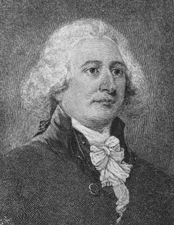John Brown (Kentucky)
| John Brown | |
|---|---|
 |
|
| 19th President pro tempore of the United States Senate | |
|
In office October 16, 1803 – February 26, 1804 |
|
| Preceded by | Stephen R. Bradley |
| Succeeded by | Jesse Franklin |
|
United States Senator from Kentucky |
|
|
In office June 18, 1792 – March 4, 1805 |
|
| Preceded by | Position established |
| Succeeded by | Buckner Thruston |
| Member of the U.S. House of Representatives from Virginia's 2nd district |
|
|
In office March 4, 1789 – June 1, 1792 |
|
| Preceded by | Position established |
| Succeeded by | Andrew Moore |
| Delegate from Virginia to the Congress of the Confederation | |
|
In office November 5, 1787 – October 21, 1788 |
|
| Personal details | |
| Born |
September 12, 1757 Augusta County, Virginia |
| Died | August 29, 1837 (aged 79) Lexington, Kentucky |
| Resting place | Frankfort, Kentucky |
| Political party | Democratic-Republican |
| Other political affiliations |
Anti-Administration |
| Spouse(s) | Margaretta Mason |
| Children | five |
| Alma mater |
College of William and Mary College of New Jersey |
John Brown (September 12, 1757 – August 29, 1837) was an American lawyer and statesman who participated in development and formation of the State of Kentucky after the American Revolutionary War.
Brown represented Virginia in the Continental Congress (1777–1778) and the U.S. Congress (1789–1791). While in Congress, he introduced the bill granting Statehood to Kentucky. Once that was accomplished, he was elected by the new state legislature as a U.S. Senator for Kentucky.
John Brown was born in Augusta County, Virginia, on September 12, 1757. He was a son of Reverend John Brown and Margaret Preston Brown, immigrants from northern Ireland. The son of a Presbyterian minister and schoolmaster, John was well educated, first at his father's Liberty Hall Academy, and then at the College of New Jersey (now Princeton University). His studies at Princeton were halted, temporarily, as a result of the approach of English troops during the American Revolutionary War.
Brown's role during the Revolutionary War is unclear. The family tradition was that Brown served under General George Washington and the Marquis de Lafayette in the Continental Army; however, no known documentation supports this account. Two years after he left the College of New Jersey (1778), Brown enrolled at The College of William & Mary where he studied law. In the fall of 1780, his studies were interrupted by the War and the arrival of the British forces to the city. Brown continued to study law by 'reading it' while working in the office of Thomas Jefferson near Charlottesville, Virginia.
...
Wikipedia
